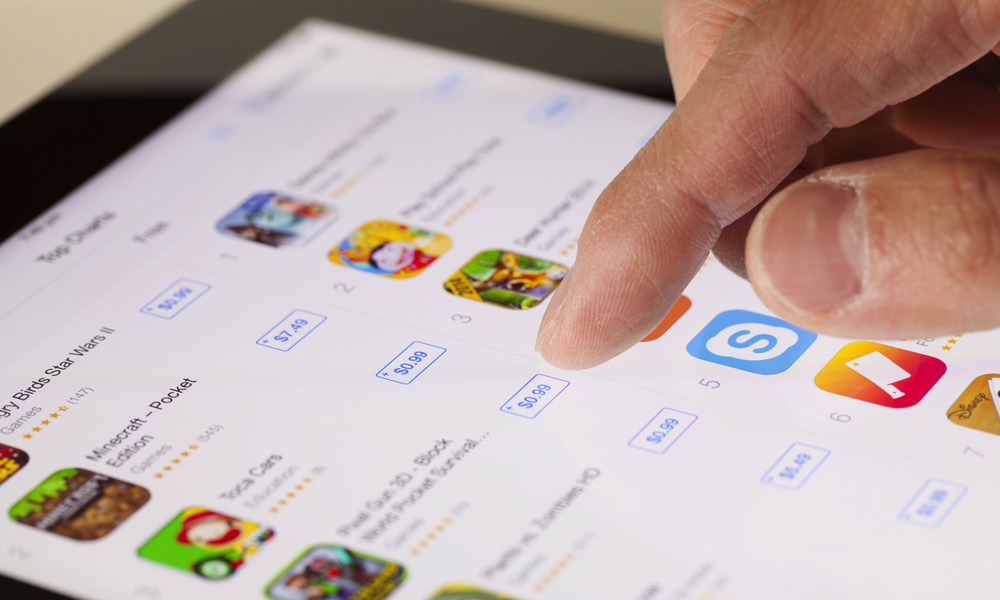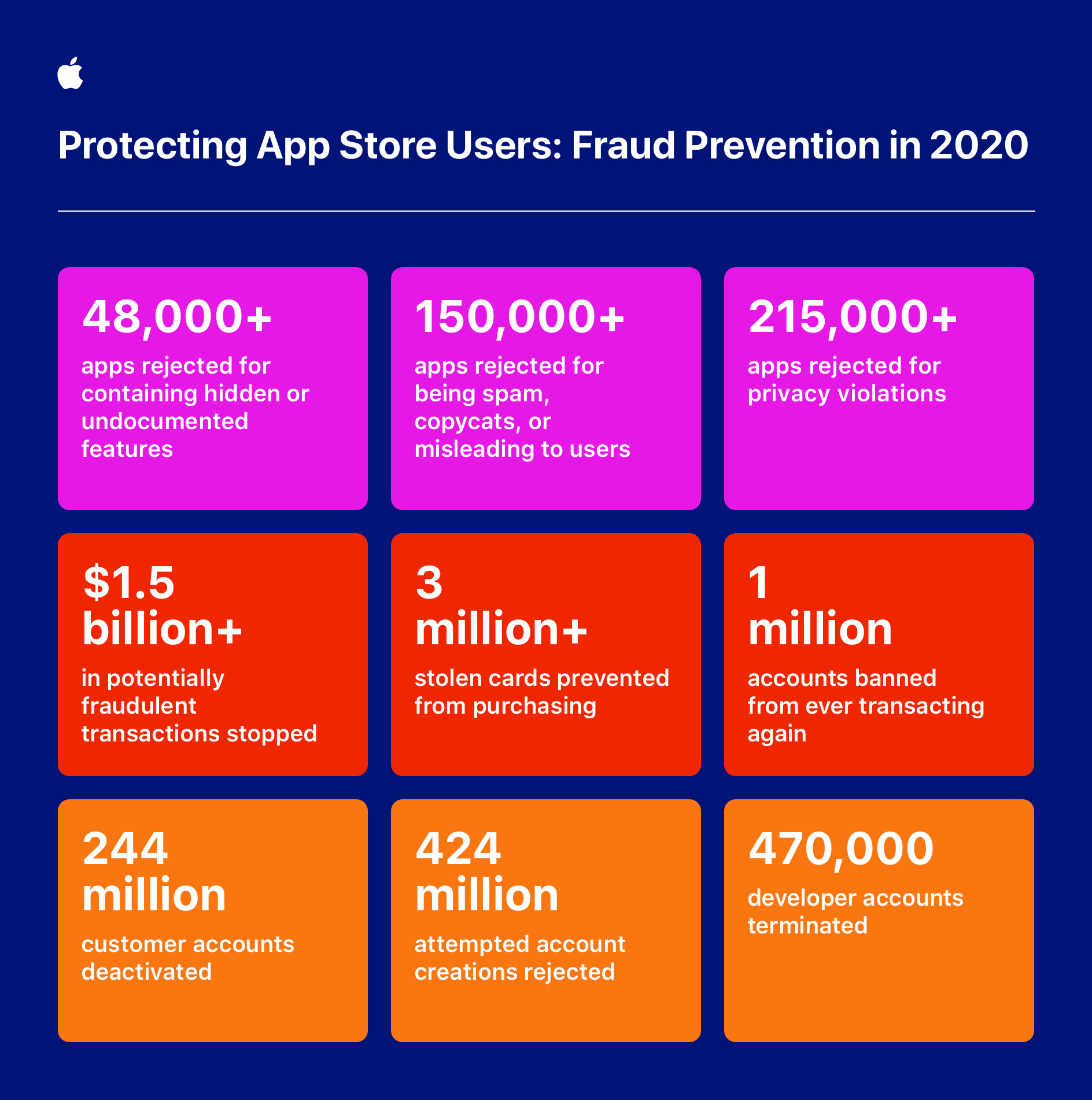Apple Just Shared These Staggering Numbers on How Much App Store Fraud It Actually Prevents
 Credit: Ymgerman / Shutterstock
Credit: Ymgerman / Shutterstock
Toggle Dark Mode
In a newsroom release that’s clearly been timed to counter recent allegations of rampant App Store fraud in the midst of its ongoing legal battle with Epic, Apple has just shared some pretty staggering figures on just how many fraudulent apps and transactions don’t get through Apple’s security procedures.
While the announcement is an obvious spin to paint Apple’s efforts in the best light possible, it’s hard to argue with the number that the iPhone maker presents here. There’s also no way they’re making these numbers up — they’d have to be backed by actual raw data or Apple wouldn’t risk making them so public.
Apple headlines the release by sharing that last year alone, it protected customers from more than $1.5 billion in potentially fraudulent transactions, through a “combination of sophisticated technology and human expertise.”
However, it goes beyond just the financial aspect, noting that during the year 2020, it rejected nearly one million app submissions, about a quarter of which were for “egregious violations that could harm users or deeply diminish their experience.”
- Over 48,000 apps were rejected for containing hidden or undocumented features.
- Over 150,000 apps were rejected for being spam, copycats, or misleading users into doing things like making overpriced or unnecessary in-app purchases.
- Around 95,000 apps were removed for “bait-and-switch maneuvers,” where an app’s functionality is fundamentally changed to break the rules after it successfully passes the App Review process.
- Over 215,000 apps were rejected for privacy violations, usually requesting more user data than they need, or mishandling the data that they do collect.
Despite Apple’s efforts, however, a few scam apps still manage to get across the moat, and often stick around longer than they should. For example, a recent report revealed that scammers have potentially earned over $365 million over the past couple of years, thanks to “fleeceware” apps that are designed to trick users into signing up for expensive monthly subscriptions — some of which were found to be as high as $3,422 per year.
Apple has been fighting against these apps for years, and it appears that it’s been taking an even heavier hand lately — back in February, several developers reported that Apple was cracking down on “rip-off” apps — those that charge disproportionate amounts of money for the features and content that they offer.
Still, as Apple notes in this week’s release, “even with these stringent review safeguards in place, with 1.8 million apps on the App Store, problems still surface.” To be fair, the handful of scam apps identified in recent analyst reports truly does seem to be dwarfed by the sheer number of apps that Apple reviews — and rejects — on a weekly basis.
To put this in perspective, the total number of apps that were estimated to have brought in $365 million in revenue was a mere 134, and many of these appear to have been on the App Store for more than a year. While there’s certainly no excuse for them to go unnoticed for this long, Apple CEO Tim Cook recently revealed that Apple rejects 40,000 apps every week, out of 100,000 that are submitted for review.
These numbers were shared by Cook in an interview last month with the Toronto Star, and while they may have been a bit exaggerated, since the math doesn’t quite match up to this week’s press release, even at a fraction of that number, it’s still sort of understandable that Apple’s App Store Review team is doing a lot more work than most of us can even imagine.
By the Numbers
In its release, Apple goes on to share some of the other actions it’s taken over the past year to combat App Store fraud:
- Over 250 million fraudulent ratings and reviews were removed from the App Store in the past year alone, out of a total of over 1 billion ratings and 100 million reviews.
- Apple terminated 470,000 existing developer accounts over fraud concerns.
- Apple also rejected an additional 250,000 developer applications for the same reason.
- Over the past year, Apple has also found and blocked nearly 110,000 illegitimate “copycat” apps on pirate storefronts — apps that are either designed to resemble popular apps or versions of popular apps that have been “cracked” or modified in other ways without the developer’s authorization.
- In the last month alone, Apple blocked more than 3.2 million instances of apps distributed illicitly through the Apple Developer Enterprise Program.
- Apple also deactivated 244 million customer accounts due to fraudulent and abusive activity,” and blocked the creation of 424 million new accounts because they “displayed patterns consistent with fraudulent and abusive activity.”
- More than 3 million stolen credit cards were prevented from being used to purchase stolen goods and services, with nearly 1 million accounts banned from transacting again. This resulted in the denial of more than $1.5 billion in potentially fraudulent transactions in 2020 alone.
Can Apple Do Better?
While Apple’s numbers make it clear that this is a “five nines sort of problem,” as John Gruber of Daring Fireball puts it — Apple does stop 99.999 percent of scams — that doesn’t mean there’s no room for improvement.
While it’s unfair to think that the App Store review process will ever reach 100% perfection, Apple is also a $2 trillion company that’s making $20 billion a year in revenue from the App Store. There’s no reason to believe that they can’t do a better job of policing it.
In the very least, Apple should be considerably more proactive in dealing with apps that have been reported as scams. There have been too many cases where scam apps have remained on the App Store for weeks or even months after they’ve been reported — and some of these reports have come from pretty reputable sources, such as other established developers, market analysts, and journalists.
Still, regardless of the source of the report, it shouldn’t take weeks for somebody in App Review to examine an app that’s been flagged as fraudulent. Whether it’s improving the automated systems or adding more manpower to the App Store review team, this shouldn’t be too difficult for the world’s most valuable company.
More importantly, however, if Apple really wants to maintain its walled garden control over the App Store, then it must do even better. Apple’s customers expect it, and until it can close every possible hole in the wall, Apple’s defence of the App Store is going to continue to fall flat in the eyes of competitors and lawmakers.







